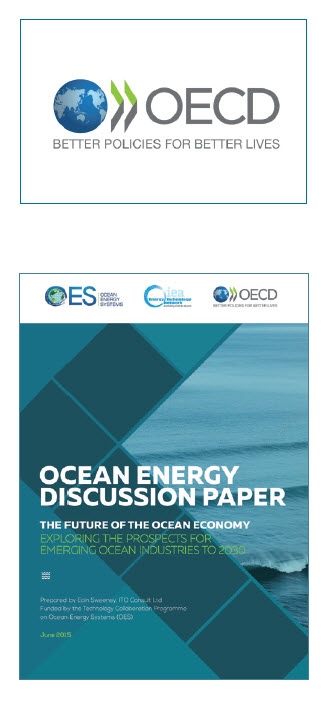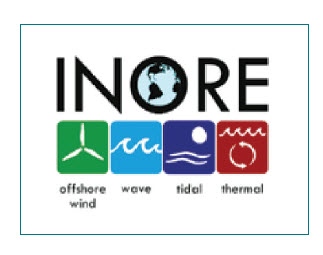International Co-operation
Collaboration with the IEA
|
In 2016 OES collaborated with the Bali Clean Energy Forum co-hosted by IEA and Indonesian Minister of Energy and Mineral Resources. It was a two-day event showcases opportunities to accelerate clean energy deployment and enhance energy efficiency around the globe. Organised on the 11th February, it was attended by more than 1000 leaders from government, industry, research and development organizations. Under the theme “Bridging the Gap and Promoting Global Partnership”, the Bali Forum aimed to explore how international partnerships can help countries in all stages of development share knowledge, technology and best practices to scale up clean energy deployment. The Chairman of the OES moderated a session on ocean energy with 6 speakers addressing the following topics: Ocean Energy in Indonesia, Ocean Energy for Island Electrification, Ocean Current Technology and Barrage Utilization of Hydro Power in Indonesia, the South East Asian Marine Energy Centre and tidal energy development, lessons learnt from French experience and Indonesian perspectives. OES usually interacts with the IEA through contributions to various IEA reports, the IEA OPEN Bulletin and trough participation in IEA meetings. In 2016 OES participated in the following meetings:
In 2016 the OES reviewed the ‘Tracking Clean Energy Progress´’ (TCEP 2016). This report highlights the development and deployment of key clean energy technologies year on year. TCEP 2016 – prepared for the Clean Energy Ministerial meeting where 23 member countries collaborate on solutions to advance clean energy globally – is an integral part of the specific recommendations to governments on how to scale up deployment of these key technologies to ensure a secure, clean and competitive energy future. |
 |
Collaboration with IES-TC 114
International Electrotechnical Commission (IEC) Technical Committee (TC) 114, Marine Energy – Wave and Tidal Energy Converters: OES has a formal liaison with this technical committee to develop international standards for wave and tidal energy technologies. A number of ExCo members serve as project leaders or participants in some of the TC114 working groups. Some OES tasks can provide technical information for future standards.
|
Collaboration with OECD The OES collaborated with the OECD project “The Future of the Ocean Economy: Exploring the prospects for emerging ocean industries to 2030”. The Report was formally launched in 2016 at a 2-day event in Seoul, attended by an international audience of ca. 50 people. OES contributed with a Discussion Paper, prepared by Eoin Sweeney, on the status of ocean energy which was published in 2016 at the OES website.
Given that Ocean Energy is still an emerging industry and that projections for output and employment are, necessarily, tentative at this stage, there is little substantially new about OE in the Report, a summary of which can be found at http://wp.me/p2v6oD-2tO. However, the Report states that “the ocean will play a key role in the transition to a more sustainable global energy system. While current global offshore wind installed capacity is in excess of 7 gigawatts (GW), projections suggest there may be potential for 40-60 GW by 2020 and growth of a further order of magnitude by 2050. And while ocean power (wave, tidal, thermal conversion, salinity gradient technology) is not yet mature or operating at commercial scale, its longer term potential is considerable. Both offshore wind and ocean-based energy are expected to gain considerably from future investment in the wake of the Paris COP21 agreement.” More information about the OECD study: http://www.oecd.org/futures/oceaneconomy.htm |
 |
|
More on INORE: https://inore.org/ |
|
COLLABORATION WITH EUROPEAN INITIATIVES
|
EERA Ocean Energy Joint Programme and OCEANARA-NET In 2016, OES organised a join workshop on “Stage Gate Metrics for Ocean Energy Technology Development” with two European initiates, the EERA Ocean Energy Joint Programme and the OCEANERA-NET. The workshop was attended by key stakeholders within the ocean energy industry and was held in Edinburgh on September 16th 2016. The outputs of this workshop are intended to provide a step-forward in the common understanding and approach to success measurement in ocean energy technology and to progress the baseline for future discussions. The workshop also forms a valuable input to the on-going international collaboration on the development of ocean energy technology and the management of the various stage-gated technology development programmes run by funders around the world. Follow-up workshops will be required to help the ocean energy sectors maintain a common approach as well as provide a forum for individual funders and technology development programme managers to share their experience of specific metrics and success thresholds appropriate to their technologies and markets. |
European Energy Research Alliance (EERA) Ocean Energy Joint Programme:
|
|
OCEAN ENERGY FORUM The Ocean Energy Forum was formed of 3 work streams for Environment & Consenting, Finance and Technology. These three work streams allowed consensus building to take place at a topic-specific level thus enabling pragmatic solutions to issues to be developed. The OES was part of the Steering Group on Environment & Consenting. More information at: |
Ocean Energy Forum
|
|
MARIBE ADVISORY SESSIONS Having explored the opportunities that exist for cooperation between different Blue Growth and Blue Economy sectors, the consortium worked with companies from these marine sectors to develop 9 multi-use of space or multi-use platform projects. The consortium’s expertise was utilised to assist companies with their business and financial models. OES was invited to attend the advisory session events. More information at: https://maribe.eu |
MARIBE objectives:
|




